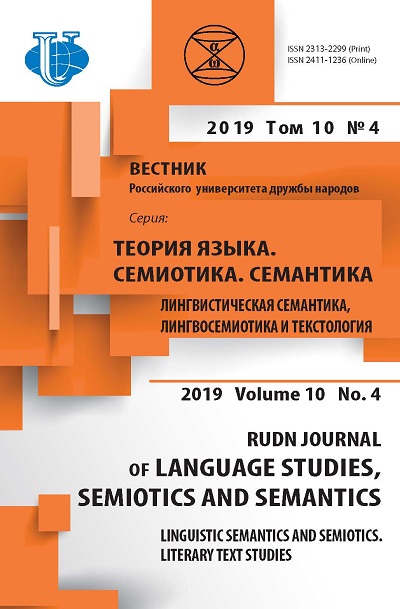Literary Domains’ Connectionin a Policultural Text
- Authors: Sinyachkin V.P.1, Bakhtikireeva U.M.1, Valikova O.A.1
-
Affiliations:
- Peoples’ Friendship University of Russia (RUDN University)
- Issue: Vol 10, No 4 (2019): Linguistic Semantics and Semiotics. Literary Text Studies
- Pages: 1048-1066
- Section: LITERARY TEXT SEMANTICS AND POETICS
- URL: https://journals.rudn.ru/semiotics-semantics/article/view/22785
- DOI: https://doi.org/10.22363/2313-2299-2019-10-4-1048-1066
- ID: 22785
Cite item
Full Text
Abstract
The authors of the article consider semiotic systems of different levels of organization as databases - domains that accumulate the number of relay units over time and communicate with each other, generating new containers of cultural information. If we study Russian literature as a domain, it turns out that it contains a constant core in the form of key themes, motifs, developed persona sphere. These resources are used by non-Russian by origin authors to create literary texts in which the acquired artistic elements are culturally transformed, resulting in the contamination of several cultural layers within the artistic whole. The mechanism of communication between domains can be called a dialogue (in the broad sense), and its varieties - intertextual roll-call, allusions, modification of case phenomena. Based on the material of A. Zhaksylykov’s novel “Dreams of the Damned”, the authors investigate proposition coincidences as a type of allusions and illustrate them using comparative analysis and hermeneutic commentary. Results : there are found propositive coincidences with the texts of A.S. Pushkin, O.E. Mandelstam, F. Sologub and others. The transformations of the text fragments are analyzed. Conclusions are drawn about intertextual acculturation (S.A. Kibalnik).
Keywords
About the authors
Vladimir Pavlovich Sinyachkin
Peoples’ Friendship University of Russia (RUDN University)
Author for correspondence.
Email: sinyachkin-vp@rudn.ru
Doctor of Philology, Professor, Head of the Department of the Russian Language and Intercultural Communication
6, Miklukho-Maklaya street, Moscow, 117198, Russian FederationUldanai Maksutovna Bakhtikireeva
Peoples’ Friendship University of Russia (RUDN University)
Email: bakhtikireeva-um@rudn.ru
Doctor of Philology, Professor, Professor of the Department of Russian Language and Intercultural Communication
6, Miklukho-Maklaya street, Moscow, 117198, Russian FederationOlga Aleksandrovna Valikova
Peoples’ Friendship University of Russia (RUDN University)
Email: valikova-o@rudn.ru
PhD in Philology, Associate Professor of the Department of Russian Language and Intercultural Communication
6, Miklukho-Maklaya street, Moscow, 117198, Russian FederationReferences
- Chiksentmihayli, M. (2013). Creativity. The flow and psychology of discoveries and inventions, I. Yushchenko (Transl.). Moscow: Career Press. (In Russ.).
- Krasnykh, V.V. (2001). Fundamentals of Psycholinguistics and Communication Theory: Lecture Course. Moscow: ITDGK “Gnosis”. (In Russ.).
- Ter-Minasova, S.G. National literature in the dialogue of cultures. Aspects of translation. URL: http://www.regionalstudies.ru/journal/homejornal/rubric/2012-11-02-22-22-15-01/275--l-r-.html (accessed: 30.05.2019).
- Kasyanova, K. (Chesnokova, V.F). (2003). On the Russian national character. Moscow: Academic project, Yekaterinburg: Business Book. (In Russ.).
- Sabitova, Z.K. (2013). Linguoculturology: textbook. Moscow: FLINT: Nauka. (In Russ.).
- Gyubbenet, I.V. (1991). Fundamentals of the philological interpretation of literary and literary texts. Moscow: Publishing House of Moscow State University. (In Russ.).
- Trubetskoy, N.S. (2000). Europe and humanity. Genghis Khan's legacy. Moscow: Agraf. pp. 29—92. (In Russ.).
- Eichenbaum, B.M. (1986). About prose. About poetry. Leningrad: Hudozhestvennaja literatura. (In Russ.).
- Valentinova, O.I. (2010). Universal principles of the analysis of Verbal Art: Special course for philologists-masters: Textbook. Allowance. Moscow: Publishing House of RUDN. (In Russ.).
- Bayevsky, V.S (2003). The history of Russian literature of the XX century: Moscow: Languages of Slavic culture. (In Russ.).
- Valikova, O. & Bakhtikireeva, U. (2014). Russian Literature as a Domain of Culture, Journal of Language and Literature, 5 (4), 271—275.
- Zhaksylykov, A.Zh. (2006). Dreams of the Damned: Trilogy. Almaty: Almaty Publishing House LLP. (In Russ.).
- Levin, I.Yu. (1998). Selected Works. Poetics. Semiotics. Moscow: Languages of Russian culture. (In Russ.).
- Novikov, A.I. (1983). Semantics of the text and its formalization. Moscow: Nauka. (In Russ.).
- Segal, D. (2006). Literature as a letter of protection. Indiana: Aquarius Publishers.
- Pushkin, A.S. (1962). Collected works: at 10 vols. Moscow. Vol. 9. P. 55. (In Russ.).
- Grekhnev, V.A. (1985). Lyrics of Pushkin. On the poetics of genres. Gorky. P. 223. (In Russ.).
- Isaev, S.G. (2012). Literary and artistic masks: Theory and poetics. St. Petersburg: DMITRY BULANIN. In Russ.).
- Valikova, O. (2015). The cycle “Dreams of the Cursed” by A. Zhaksylykova and “The Caucasian Prisoner” by A. Pushkin: propositive coincidences In Materials of the International Scientific and Practical Conference “1st Spring Scientific Readings”, May 30, 2015, Kiev. pp. 61—64. (In Russ.).
- Tyupa, V.I. Modes of art in Introduction to literary criticism In L.V. Chernets, V.E. Halizev, A.Ya. Esalnek et al; L.V. Chernets (Ed.). URL: http://taviak.ru/distance/wp-content/uploads/ 2014/obshcheobrazovatelnye_distsipliny/Literatura/Chernec.pdf (accessed: 30.05.2019). (In Russ.).
Supplementary files












